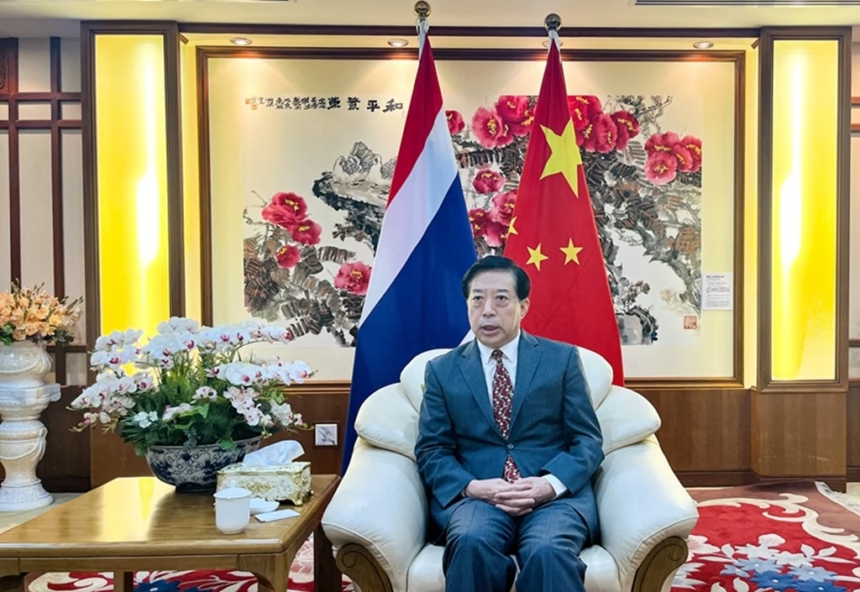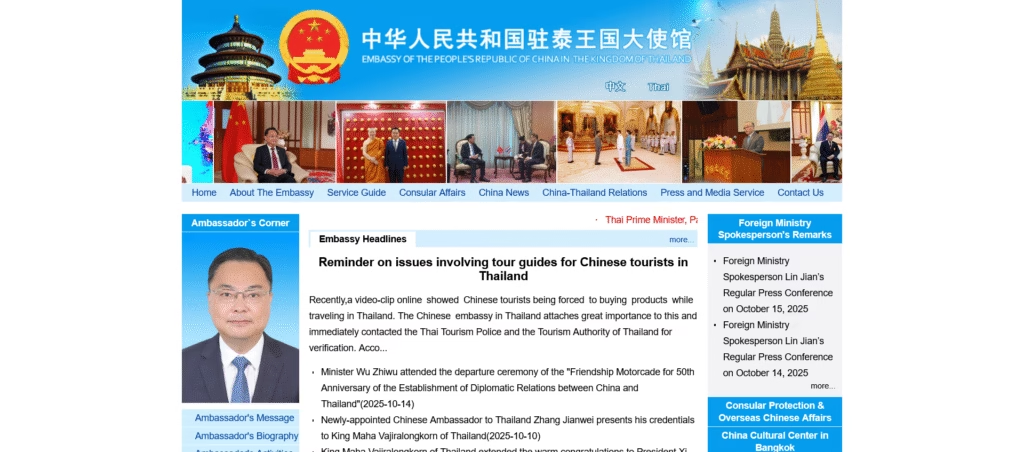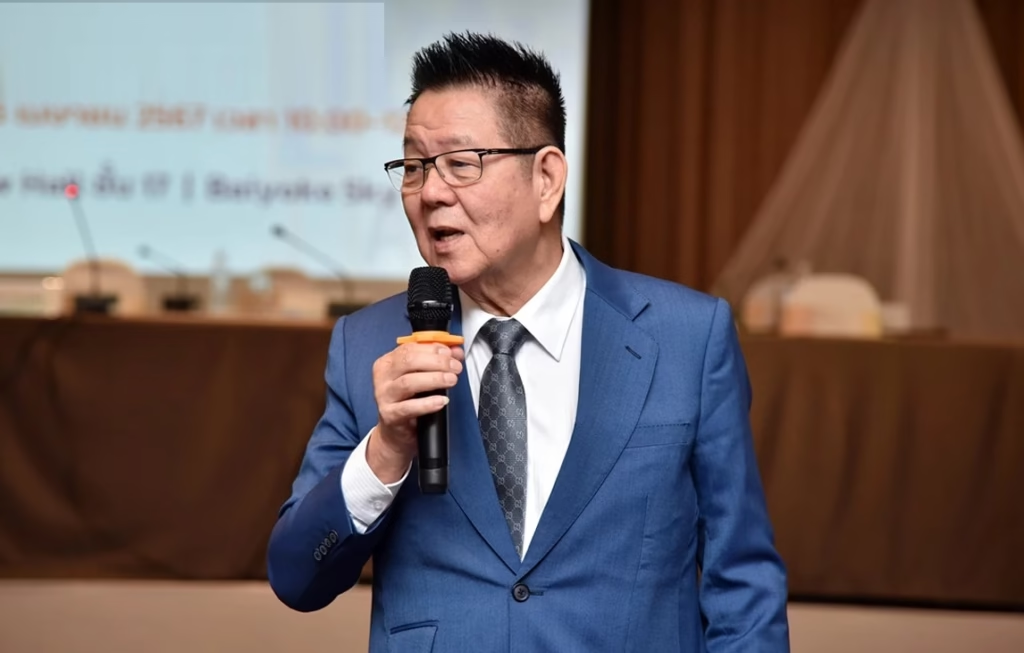BANGKOK — The Chinese Embassy in Thailand has issued a sharp warning about ultra-low-cost tour packages, urging travellers to avoid cheap deals that lead to coercion and regret. The notice, posted on the Chinese Embassy’s Facebook Page on 15 October 2025, follows a flood of viral clips showing unlicensed guides bullying tourists into shopping stops.
For Thailand’s tourism sector, still nursing post-pandemic wounds and facing weak demand, the statement risks denting confidence in its largest source market as peak season approaches.
The alert was sparked by a wave of videos that spread across Douyin and Weibo last week. One clip shows a Chinese-speaking guide, later identified as an unlicensed operator with a PRC passport, berating a busload of tourists outside a Bangkok duty-free shop.
“Buy here, or don’t get back on the bus,” he shouts, before threatening to leave them “stranded in Thailand” and “not allowed to return to China.” The footage, watched millions of times within hours, captures anxious passengers as the guide holds passports and schedules, steering them towards overpriced goods linked to high commissions.

Tour Guide Had No Licence
The embassy responded quickly. “We took the incident with utmost seriousness,” its advisory said, adding that it had contacted Thailand’s Tourist Police and the Tourism Authority of Thailand (TAT). A joint investigation confirmed the guide had no licence.
Thai law forbids foreigners from working as licensed tour guides, with penalties of up to one year in jail and fines of 100,000 baht, about 3,000 US dollars. Officials raided a Thai tour company in the Rom Klao area of Bangkok.
The firm held a valid business permit, but was accused of selling “below-cost” tours that depend on forced shopping to make money. Legal cases are moving ahead against all involved. Tourism and Sports Minister Atthakorn Sirilatthayakorn promised tougher action.
“We will not tolerate practices that tarnish our kingdom’s welcoming smile,” he said at a press briefing.
The episode fits a long-running pattern linked to “zero-dollar tours,” which have dogged Thailand for years. These trips lure travellers from China with rock-bottom prices, sometimes including free flights and hotels, then push them through commission-heavy shops to cover costs.
First-time visitors, tired and facing language barriers, describe being driven to jewellery stores or gem centres for hours, pressured into spending thousands on goods worth far less.
“It’s emotional blackmail dressed up as hospitality,” said a 28-year-old office worker from Shanghai, who shared her story on Weibo. “We paid very little for the tour, but went home thousands poorer and shaken.”
Chinese Embassy Warning
The Chinese Embassy’s message sets out clear advice. “Do not be tempted by unrealistically cheap tours,” it warns, urging bookings through licensed Chinese outbound agencies with proper contracts. It encourages travellers to verify guide licences using Thailand’s official tourism apps, and to keep proof such as receipts, recordings, and witness details for any dispute.
Key numbers are listed in the advisory, including Thailand’s Tourist Police at 1155 and the embassy’s consular helpline at 02-245-7010 for Mandarin assistance. “Vigilance is your best companion in the Land of Smiles,” the statement concludes.
For Thailand, the timing is tough. The country earned about 45 billion US dollars from tourism last year, buoyed by around 11 million visitors from China. The sector supports about one in five jobs and accounts for roughly 12% of GDP. After a slow recovery from COVID, operators now face inflation, a weaker baht, and uncertain global demand.
Chinese arrivals remain 20% below pre-pandemic levels, even though they typically spend more than other groups on activities from elephant parks to beach resorts in Phuket and Pattaya. Scandals like this one revive memories of the 2016 Golden Week crackdown on zero-dollar operations, when arrivals dropped by around 30% almost overnight.
Warning is a Dynamite Powder Keg
Industry figures are worried. “This embassy warning is dynamite in a powder keg,” said Sistiwat Chivarattanaporn, president of the Association of Thai Travel Agents (ATTA). “Chinese platforms are buzzing with #ThailandScam, and bookings are already dipping. If unchecked, low-price operators from abroad will dominate the market, squeezing out ethical companies.”
A recent TAT survey estimated that reputational damage from such cases could cost up to 15% in potential revenue. Competitors like Vietnam and Japan are drawing cautious travellers with safety-focused campaigns.
“Thailand’s image as a haven is cracking,” added tourism analyst Dr Kulachai Temtrakul, pointing to more complaints in 2024 from Russian and Indian groups caught in similar schemes. “Without systemic reform, including tighter checks on nominee companies and real-time visa scrutiny, we risk handing our golden goose to the foxes.”
The hit on the ground feels real. At Chatuchak market in Bangkok, vendors who relied on Chinese tour buses report sales down 25% this month. “They used to flood in, wallets open,” said Noi, a 52-year-old stallholder, fanning herself in the October heat. “Now, these stories scare them off. We are all paying for a few bad actors.” Hoteliers in Chiang Mai share the gloom, with occupancy stuck near 60% despite visa waivers meant to win back China’s middle class.
There are signs of action. Thai authorities have promised more patrols and a new Tourism Integrity Task Force to vet packages before arrival. The embassy has also suggested joint webinars to brief outbound groups. For now, the advisory hangs over Suvarnabhumi’s busy terminals, where new arrivals still pose with orchid garlands.
















